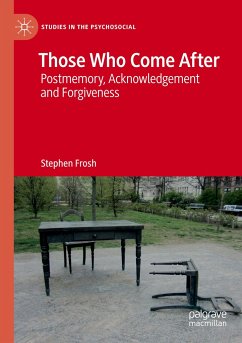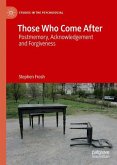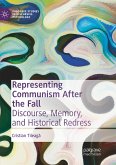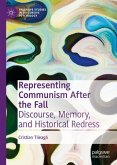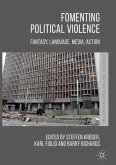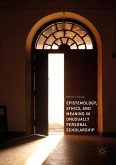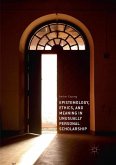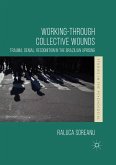This book explores the legacies of suffering in relation to 'those who come after' - the descendants of victims, survivors and perpetrators of traumatic events. It draws on recent discussions of 'postmemory' and 'haunting' that are concerned mainly with the transgenerational impact of personal and social trauma. It examines how we are connected to past events for which we have no direct responsibility yet in which we might in some way be 'implicated' and it asks how we might attain a position of active witnessing that helps resolve the suffering of others. Those Who Come After includes vivid accounts of witnessing from a variety of perspectives, ranging from Biblical and Jewish stories to contemporary art and music. The book draws on psychosocial studies and psychoanalysis to help make sense of this material and to develop an understanding of acknowledgment and responsibility that is both ethical and emancipatory. Those Who Come After will be of great interest to readers in psychosocial studies and psychoanalysis and to all who are concerned with the question of how to put past suffering to rest.
"It is clearly written from the perspective of a Jew who did not directly experience the Nazi genocide but has had to reckon with their historical responsibility, who wonders what witnessing means for them. ... I finished reading this thoughtful and challenging book and found myself wondering whether forgetfulness also has its ethical uses. Frosh shows us that ethical struggle involves looking back even when one wants to look away." (Judith Butler, Psychoanalysis, Culture & Society, November 15, 2022)
"This powerful and moving book draws together work Stephen Frosh has been doing over a long career ... . I am grateful, though necessarily and hopefully usefully anxious, for Frosh's comprehensive examination of the individual and social work of reparations and witnessing. Frosh moves the reader along a demanding intellectual and moral journey. ... I read Frosh's book as a hugely helpful and informative guide to the choices - individual and social - that we face." (Adrienne Harris, Psychoanalysis and History, Vol. 23 (3), 2021)
"Those Who Come After is indispensable for anyone wishing to understand how the legacies of suffering that have resulted from the perpetration of mass crimes continue to shape us long after they are committed. The book's interdisciplinary scope ... forms a valuable addition to a field that is often dominated by narrow disciplinary accounts." (Roger Frie, HHS History of The Human Sciences, histhum.com, February 3, 2020)
"This is an absolute fire cracker of a book. Frosh discusses - as few do - the question of what right he has to look at issues 'to which I have had very limited exposure and of which I have no direct experience.' ... And I ended the book moved beyond anything I had expected." (Baroness Julia Neuberger, Jewish Chronicle, August 23, 2019)
"This powerful and moving book draws together work Stephen Frosh has been doing over a long career ... . I am grateful, though necessarily and hopefully usefully anxious, for Frosh's comprehensive examination of the individual and social work of reparations and witnessing. Frosh moves the reader along a demanding intellectual and moral journey. ... I read Frosh's book as a hugely helpful and informative guide to the choices - individual and social - that we face." (Adrienne Harris, Psychoanalysis and History, Vol. 23 (3), 2021)
"Those Who Come After is indispensable for anyone wishing to understand how the legacies of suffering that have resulted from the perpetration of mass crimes continue to shape us long after they are committed. The book's interdisciplinary scope ... forms a valuable addition to a field that is often dominated by narrow disciplinary accounts." (Roger Frie, HHS History of The Human Sciences, histhum.com, February 3, 2020)
"This is an absolute fire cracker of a book. Frosh discusses - as few do - the question of what right he has to look at issues 'to which I have had very limited exposure and of which I have no direct experience.' ... And I ended the book moved beyond anything I had expected." (Baroness Julia Neuberger, Jewish Chronicle, August 23, 2019)

